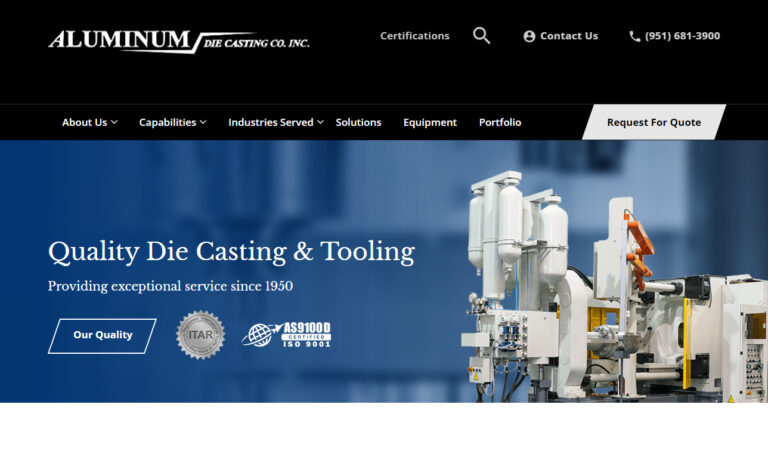The Only Guide to Aluminum Castings Company
Table of ContentsAll About Aluminum Castings CompanyThe Basic Principles Of Aluminum Castings Company Aluminum Castings Company for DummiesGetting My Aluminum Castings Company To WorkSome Known Facts About Aluminum Castings Company.Everything about Aluminum Castings Company7 Simple Techniques For Aluminum Castings CompanyGet This Report on Aluminum Castings Company
There are 2 main kinds of die casting used in the aluminum casting sector: warm chamber pass away casting and cold chamber pass away spreading. The key distinction in between these approaches is exactly how the molten steel is delivered to the mold. In hot chamber pass away casting, frequently used for lower melting point metals, the melting pot is directly attached to the equipment, and a bettor forces the product through a gooseneck into the die dental caries.
Fascination About Aluminum Castings Company
In these approaches, the mold is intentionally ruined or broken away in order to extract the completed aluminum casting. Common procedures under the category of expendable mold and mildew casting include (financial investment spreading),,, and investment spreading. When making custom aluminum components using expendable molds, manufacturers put liquified aluminum or light weight aluminum alloys right into the mold and mildew, which is after that busted apart to release the strengthened steel part.
The is one of the earliest and most utilized forms of aluminum spreading. It involves condensing specialized factory sand, often enhanced with clay or material, around a specifically crafted recyclable pattern that determines the form and internal information of the completed aluminum product. The pattern system includes risers and vents to handle the flow of liquified metal and to stop casting problems such as shrinkage porosity.
The Ultimate Guide To Aluminum Castings Company

This mold and mildew is then preheated before the pouring of molten aluminum or aluminum alloy. As the metal fills the shell, it captures the elaborate details and fine surface finish of the mold. When cooled, the ceramic is mechanically or chemically escaped, enabling for the removal and separation of private cast parts.
The 4-Minute Rule for Aluminum Castings Company
Permanent mold and mildew casting uses reusable steel molds and is perfect for automation with regular high quality and less waste. Expendable mold and mildew casting uses single-use mold and mildews, like sand or foam, using design flexibility and reduced tooling costs for prototypes or brief runs. Die spreading is best for creating high quantities of light weight aluminum components that need tight resistances, fine information, and smooth surfaces.
The Toshiba Machine DC-J Series consists of pass away casting devices appropriate for light weight aluminum. Known for their robust building and high shot efficiency, these devices make sure reliable and accurate casting (Metal Foundry).

While aluminum can be made use of in its pure form, it is frequently alloyed with other steels to improve its residential or commercial properties next page or the properties of the other metals. These alloys supply improved performance for different applications. Aluminum alloys are categorized into eight collection, phoned number from one to 8. The first digit(s) of the number suggest the main alloying component combined with aluminum.
Aluminum Castings Company Fundamentals Explained
This alloying improves the toughness and solidity of light weight aluminum however reduces its ductility and corrosion resistance. The 2000 collection alloys are testing to weld however can be warm treated to boost their residential or commercial properties. The 3000 series alloys are mainly alloyed with manganese. This combination enhances deterioration resistance while offering modest toughness.
The 4000 series alloys are alloyed with silicon, which reduces the melting point and boosts fluidity. This makes it a prominent choice for casting, as it is very easy to develop in its liquified state.
Get This Report on Aluminum Castings Company
This series is categorized as a high-strength alloy, specifically suited for sheet and plate applications because of its superb weldability. Its resistance to deterioration from acids and alkalis makes it suitable for usage in harsh and hostile atmospheres (Aluminum Melting and Casting). The 6000 collection alloys are alloyed with both magnesium and silicon, supplying an equilibrium of strength, mechanical residential properties, and corrosion resistance
Handling the 6000 collection requires specialized and sophisticated devices, which can be intricate and pricey. This collection is understood for its exceptional deterioration and oxidation resistance, as well as its convenience of layer, therapy, and workability. The 7000 collection light weight aluminum alloys are the greatest and most resilient among aluminum kinds, with strength comparable to about two-thirds of industrial-grade A3 steel.
The Definitive Guide for Aluminum Castings Company
Zinc is the key alloying aspect in the 7000 series, boosting the firmness of the aluminum, despite the fact that zinc's firmness is comparable to that of light weight aluminum on the Mohs scale. The 8000 series aluminum alloys are largely alloyed with tin, along with percentages of copper and nickel (Aluminum Castings). While these alloys supply reduced strength compared to other collection, they stand out in machinability and put on resistance
Aluminum cast heatsinks are electrically conductive, permitting them to be based efficiently. They are often cast with incorporated attributes that lessen the need for additional procedures, such as additional machining or assembly, bring about additional price savings. Aluminum casting is often made use of to produce braces for both heavy-duty commercial equipment and family appliances.
The 7-Minute Rule for Aluminum Castings Company
The single-piece building of aluminum brackets enhances their strength and resilience, minimizing the possibility of failing. If holes are needed, they can be included directly in the spreading mold and mildew, decreasing the demand for post-production finishing (https://telegra.ph/Aluminum-Castings-Company-Crafting-Strength-Precision-and-Innovation-11-10). Producers have increasingly embraced aluminum spreading for golf tools because of its durability, security, and flexibility in shaping